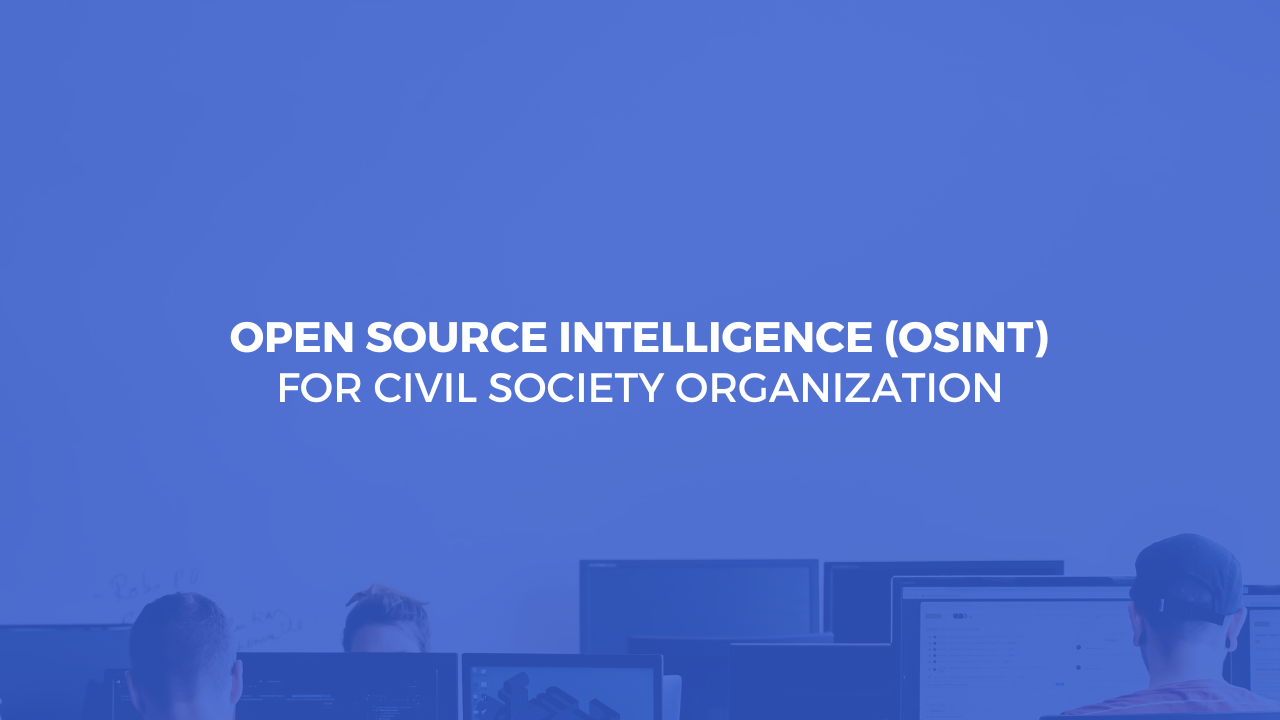In this article, I’ll be sharing some insights on how Open-source intelligence (OSINT) can be a game-changer for the Civil Society sector. From my experience working with +2000 CSOs and activists across the MENA region, I’ve witnessed firsthand how OSINT, when used strategically, can significantly strengthen the work of civil society organizations. So let’s explore the ways CSOs can benefit from this powerful tool!
Understanding the Benefits of OSINT for CSOs
First, let me clarify what OSINT actually means: it refers to the collection and analysis of publicly available information for various purposes. Over the years, OSINT has gained recognition for its value in empowering organizations, including civil society organizations (CSOs). From my work in Cybersecurity and Civic Technology, I’ve identified some key benefits that CSOs can enjoy through OSINT:
1. Staying Informed About Your Context
One of the biggest challenges I’ve seen CSOs face is keeping up with everything happening in their area of interest. OSINT provides a systematic way to monitor the latest developments—whether it’s changes in government policies, emerging social trends, or the activities of other organizations working in your field. Armed with this knowledge, CSOs can respond quickly and effectively to new opportunities or threats, ensuring they stay relevant and impactful in their work.
2. Identifying Potential Partners and Allies
Creating real, lasting change often requires joining forces with like-minded organizations and individuals. OSINT can help CSOs discover those valuable allies who share their passions, values, and goals. Through my years of relationship-building in the civil society space (including my connection with SimSim-Participation Citoyenne and the Innovation for Change MENA Hub), I learned that finding the right partners can lead to powerful collaborations and networks that amplify impact exponentially.
3. Gathering Evidence for Advocacy
Sometimes, the most compelling evidence for advocacy work lies hidden in publicly available sources, and OSINT acts as the tool to uncover it. CSOs can use OSINT to gather data from government databases, social media, news sources, and other public platforms to support their research and advocacy efforts. This creates a solid, fact-based foundation for their work—something I always emphasized when delivering capacity-building programs on Cybersecurity and Digital Rights. Armed with these insights, CSOs can confidently advocate for change and make their case to decision-makers.
4. Promoting Transparency and Public Engagement
Transparency is crucial for building trust with the public and stakeholders—a value rooted in my approach to both my professional work and community engagement. OSINT allows CSOs to be transparent and open about their work by using publicly available information to document their impact and hold powerful entities accountable. This transparency fosters accountability and encourages more people to join the cause, creating that ripple effect of positive change we all hope to see.
Practical Tips for Leveraging OSINT in Civil Society Work
Based on my experience implementing digital security and innovation programs, here are some practical tips for CSOs looking to integrate OSINT into their work:
Cultivate a Curiosity-Driven Approach
OSINT thrives on curiosity and a willingness to explore. I encourage teams to approach OSINT with an open mind and a sense of exploration—this is something I learned during the COVID lockdown when I seized the opportunity to launch AmanRaqmy.org. Every insight has the potential to drive meaningful change, so it’s important to nurture a culture of curiosity within your organization, where team members feel empowered to ask questions and investigate leads.
Equip Yourself with the Right Tools
The right tools make all the difference in effective OSINT work. Web scraping tools, social media monitoring platforms, and public databases are essential resources in any OSINT toolkit. From my experience providing technology support to CSOs, I recommend that organizations experiment with different tools (many of which are free or low-cost) to see which best meets their specific needs and technical capacity.
Embrace Diversity in Your Information Sources
Relying on a single information source can introduce bias and give you an incomplete picture—something I’ve observed many times when working with CSOs on their research methodologies. Organizations should diversify their OSINT sources to get a well-rounded understanding of the issues they’re working on. By gathering data from news sites, social media, government records, specialized databases, and community sources, CSOs can ensure a more comprehensive and unbiased view that strengthens their advocacy.
These practices, combined with a commitment to digital security (because OSINT work can sometimes expose organizations to risks), can help CSOs leverage OSINT effectively while protecting themselves and the communities they serve—something that remains at the core of my work in Cybersecurity for civil society.
FAQs
1. What is OSINT?
OSINT, or Open-Source Intelligence, refers to the collection and analysis of publicly available information from sources like websites, social media, and government databases.
2. How can OSINT benefit civil society organizations?
OSINT can help CSOs stay informed about policy changes, discover potential partners, gather valuable insights, and promote transparency in their advocacy efforts.
3. What are some common OSINT tools?
Popular OSINT tools include web scrapers, social media monitoring platforms, and public databases. These tools assist organizations in collecting and analyzing information efficiently.
4. How can OSINT promote transparency?
OSINT enables CSOs to be transparent about their work by sharing their findings with the public. It also allows organizations to hold others accountable by uncovering publicly available information.
5. What challenges can CSOs face when using OSINT?
Challenges include information overload, ensuring data accuracy, and navigating the vast range of available sources. CSOs must also be cautious of bias in the information they collect.
6. Why is it important for CSOs to diversify their OSINT sources?
Diversifying OSINT sources helps CSOs avoid bias and ensures a more comprehensive understanding of the issues they are investigating. It allows for more well-rounded and accurate advocacy.
